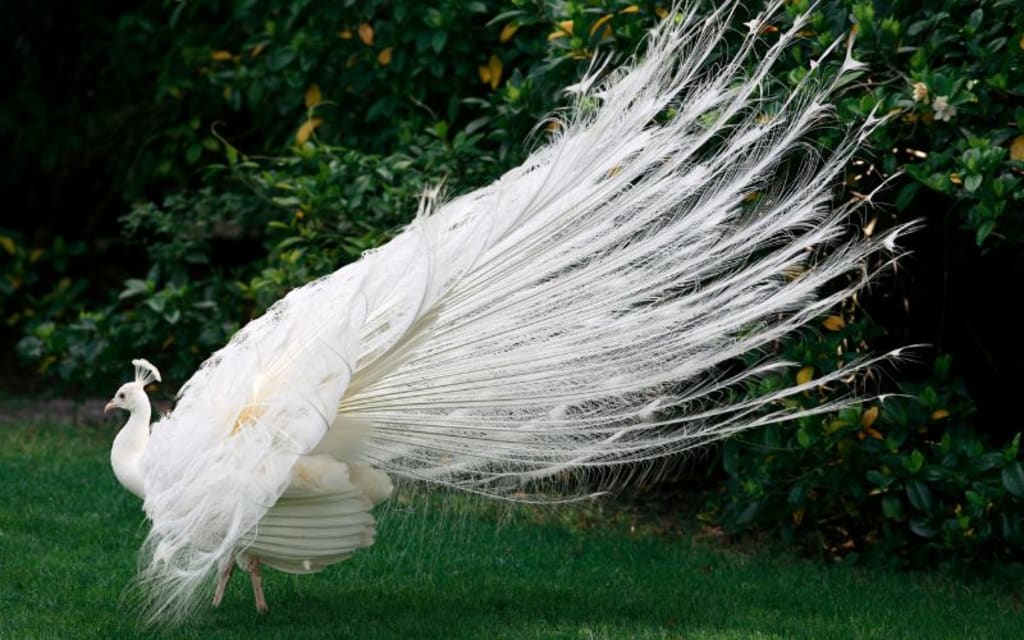Where Can White Peacocks Be Found?
Discovering the Secret Hideouts

Introduction to White Peacocks
White peacocks are a fascinating and rare variant of the more commonly known Indian peafowl. With their stunning white plumage and majestic appearance, they have captured the imagination of people around the world. In this article, we will delve into the secrets of white peacocks, exploring their unique beauty, where they can be found, and the conservation efforts aimed at protecting these magnificent creatures.
The Unique Beauty of White Peacocks
White peacocks are truly a sight to behold. Their pristine white feathers create a striking contrast against the lush greenery of their surroundings. Unlike their colorful counterparts, the white peacock's lack of pigmentation is due to a genetic mutation known as leucism, which affects the production of melanin. This absence of color gives them an ethereal and almost otherworldly appearance, making them a favorite subject for photographers and nature enthusiasts alike.
Facts about White Peacocks
Beyond their enchanting appearance, there are several interesting facts about white peacocks that further add to their allure. Contrary to popular belief, white peacocks are not albino. Albino animals lack all pigmentation, including their eyes, whereas white peacocks have normally colored eyes. Additionally, white peacocks still possess the iconic long tail feathers, known as a train, which they use to attract mates during courtship displays. These trains can reach lengths of up to five feet and are a testament to the grandeur of these magnificent birds.
Where Can White Peacocks Be Found?
White peacocks can be found in various parts of the world, although their presence is relatively rare compared to their colorful counterparts. Their natural habitat includes regions such as India, Sri Lanka, and Southeast Asia. In these areas, they can often be spotted in the wild, gracefully perched on tree branches or roaming through gardens and parks. Additionally, white peacocks are also found in captivity in select zoos and private collections, where they are cared for and admired by visitors from around the globe.
White Peacock Habitats Around the World
White peacocks have adapted to a diverse range of habitats, allowing them to thrive in different environments. In India, they can be found in the arid regions of Rajasthan, as well as the lush forests of Kerala. Sri Lanka is also home to a significant population of white peacocks, particularly in the national parks of Yala and Uda Walawe. In Southeast Asia, countries like Thailand and Malaysia boast white peacock populations in their tropical rainforests. These habitats provide the necessary resources and shelter for white peacocks to flourish.
How Many White Peacocks Are There in the World?
Determining the exact number of white peacocks in the world is a challenging task due to their elusive nature and varying populations across different regions. However, it is estimated that there are only a few thousand white peacocks in existence. Their rarity and limited distribution make encounters with these majestic creatures even more special. Efforts are underway to monitor and protect their populations, ensuring their continued presence in the wild for future generations to appreciate.
Conservation Efforts for White Peacocks
Recognizing the importance of preserving white peacocks and their habitats, various conservation organizations have taken initiatives to safeguard these magnificent birds. These efforts include creating protected areas, implementing conservation programs, and raising awareness about the significance of biodiversity conservation. By focusing on habitat restoration, community involvement, and scientific research, these organizations strive to ensure the survival and well-being of white peacocks and their ecosystems.

Mythology and Symbolism of White Peacocks
Throughout history, white peacocks have been revered and symbolized different meanings across cultures. In Greek mythology, the peacock was associated with the goddess Hera, who adorned her chariot with the bird's feathers. In Hindu mythology, the peacock is associated with Lord Krishna and is considered a symbol of purity and immortality. Its white variant, therefore, holds particular significance, representing divine beauty and spirituality. These mythological connections add an extra layer of mystique to the already captivating presence of white peacocks.
Capturing the Beauty of White Peacocks through Photography
Photographing white peacocks can be a truly rewarding experience for both amateur and professional photographers. Their striking appearance, coupled with their graceful movements, provides ample opportunities for capturing breathtaking images. To capture the beauty of white peacocks, it is essential to understand their behavior and habitat. Patience and a keen eye for composition are crucial in capturing the perfect shot. Whether in the wild or in a controlled environment, photographing white peacocks allows us to appreciate their unique beauty and share it with others.
Conclusion
White peacocks, with their ethereal beauty and rare presence, are a true marvel of nature. From their unique appearance to their symbolic significance, these magnificent birds continue to captivate our imagination. While their populations may be small compared to their colorful counterparts, efforts are being made to preserve their habitats and ensure their survival. The next time you catch a glimpse of a white peacock, take a moment to appreciate its elegance and the wonder it represents in the natural world.






Comments
There are no comments for this story
Be the first to respond and start the conversation.